美国殖民时期文学中英文双语课件
- 格式:ppt
- 大小:4.60 MB
- 文档页数:80

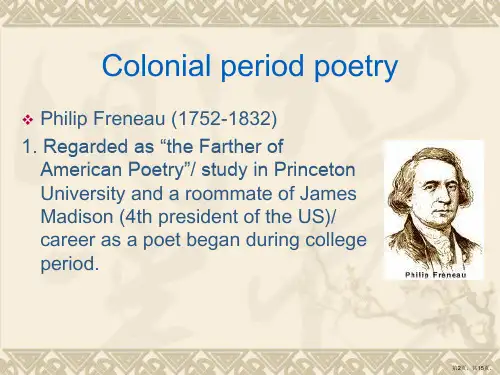
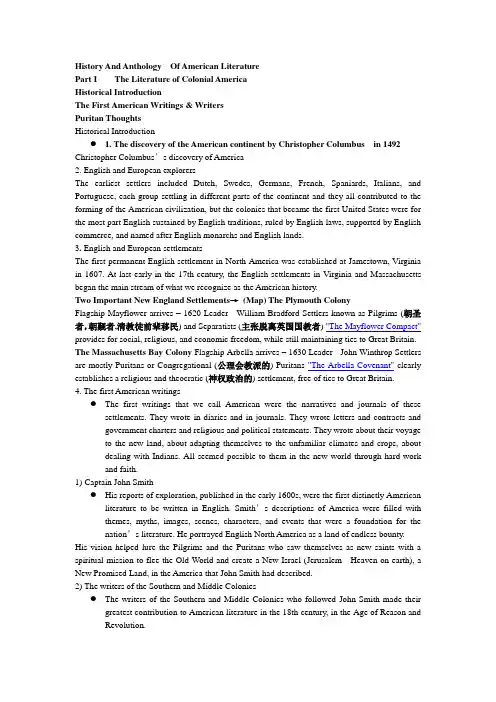
History And Anthology Of American LiteraturePart I The Literature of Colonial AmericaHistorical IntroductionThe First American Writings & WritersPuritan ThoughtsHistorical Introduction● 1. The discovery of the American continent by Christopher Columbus in 1492 Christopher Columbus’s discovery of America2. English and European explorersThe earliest settlers included Dutch, Swedes, Germans, French, Spaniards, Italians, and Portuguese, each group settling in different parts of the continent and they all contributed to the forming of the American civilization, but the colonies that became the first United States were for the most part English sustained by English traditions, ruled by English laws, supported by English commerce, and named after English monarchs and English lands.3. English and European settlementsThe first permanent English settlement in North America was established at Jamestown, Virginia in 1607. At last early in the 17th century, the English settlements in Virginia and Massachusetts began the main stream of what we recognize as the American history.Two Important New England Settlements→(Map) The Plymouth ColonyFlagship Mayflower arrives – 1620 Leader - William Bradford Settlers known as Pilgrims (朝圣者,朝觐者,清教徒前辈移民) and Separatists (主张脱离英国国教者) "The Mayflower Compact" provides for social, religious, and economic freedom, while still maintaining ties to Great Britain. The Massachusetts Bay Colony Flagship Arbella arrives – 1630 Leader - John Winthrop Settlers are mostly Puritans or Congregational (公理会教派的) Puritans "The Arbella Covenant" clearly establishes a religious and theocratic (神权政治的) settlement, free of ties to Great Britain.4. The first American writings●The first writings that we call American were the narratives and journals of thesesettlements. They wrote in diaries and in journals. They wrote letters and contracts and government charters and religious and political statements. They wrote about their voyage to the new land, about adapting themselves to the unfamiliar climates and crops, about dealing with Indians. All seemed possible to them in the new world through hard work and faith.1) Captain John Smith●His reports of exploration, published in the early 1600s, were the first distinctly Americanliterature to be written in English. Smith’s descriptions of America were filled with themes, myths, images, scenes, characters, and events that were a foundation for the nation’s literature. He portrayed English North America as a land of endless bounty.His vision helped lure the Pilgrims and the Puritans who saw themselves as new saints with a spiritual mission to flee the Old World and create a New Israel (Jerusalem---Heaven on earth), a New Promised Land, in the America that John Smith had described.2) The writers of the Southern and Middle Colonies●The writers of the Southern and Middle Colonies who followed John Smith made theirgreatest contribution to American literature in the 18th century, in the Age of Reason and Revolution.●William Byrd II Thomas JeffersonUntil that time, literature developed slowly, especially in the South. Farms widely dispersed. Towns were few. Illiteracy was high. And there was little of the religious ferment and zeal that inspired such a tide of literature to flow from Puritan New England.The First American Writer●Captain John Smith (1580-1631) was the first American writer and he published eight inall.●1)A True Relation of Such Occurrences and Accidents of Note as Hath Happened inVirginia Since the First Planting of That Colony(1608), defending the handling of the settlement and proclaiming the merits of the new land●2) A Map of Virginia: with a Description of the Country (1612), a guide to the countryand an invitation to the bold sprits needed to enlarge and strengthen the English plantations in the new land●3) General History of Virginia (1624), containing his most famous tale of how the Indianprincess Pocahontas saved him from the wrath of her father Powhatan●Captain John Smith contributed more to the survival of the Jamestown colony than didanyone else. And he saw from the beginning what was eventually to be a basic principle of American history, the need of “workers”instead of “gentlemen” for the tough job of planting colonies and pushing the frontiers westward.Early New England Literature●New England: →(Map)● A region of the northeast United States comprising the modern states of Maine, NewHampshire, Vermont, Massachusetts, Connecticut, and Rhode Island.1) A literature of ideas: New England had from the beginning a literature of ideas: theological, moral, historical, political. The Puritans had come to New England for the sake of religious freedom, while Virginia had been planted mainly as a commercial venture. Southern society was almost completely rural, interested primarily in the development of a tobacco economy.●2) Theocracy:The Puritans in New England embraced hardships, together with thediscipline of a harsh church. The first intention in Massachusetts was to found a theocracy —a society in which God would govern through the church. The church thus became the supreme political body. The ideal may have been inspiring, but because of the imperfections of the human material, in practice theocracy often led to injustice and intolerance (不容异说, 偏狭).●3) The Puritan values that dominated much of the earliest American writing: Overthe years the puritans built a way of life that was in harmony with their somber religion, one that stressed hard work, thrift (节俭;节约), piety (虔诚;虔敬), and sobriety (节制;严肃). These were the Puritan values that dominated much of the earliest American writing, including the sermons, books, and letters of such noted Puritan clergyman as John Cotton and Cotton Mather.●Cotton Mather wrote more than 450 works, an example as well as an advocate of thePuritan ideal of hard work.4) The American poets: The American poets who emerged in the 17th century adapted the style of established European poets to the subject matter confronted in a strange, new environment. Anne Bradstreet was one such poet.William Bradford and John Winthrop● 1. William Bradford (1590-1657), first governor of Plymouth. He wrote The History ofPlymouth Plantation (1856).●William Bradford started the History in 1630, ten years after the Mayflower voyage,beginning his story with an account of the small group of Puritans who migrated from England to Amsterdam and then to the New World. In addition to History, Bradford left a wealth of letters, other prose writings about the colony, and even a narrative poem.●He was perhaps the greatest of the Pilgrim Fathers. The New England colonies mournedhim at his death, in words written later by Cotton Mather, as “a common blessing and father to them all”.●The Pilgrim Fathers: English Puritans who went to America in 1620 and founded thecolony of Plymouth, Massachusetts2. John Winthrop (1588 –1649), first governor at Boston. He wrote The History of New England (1826).John Winthrop began to keep a journal on the Bay Colonists’voyage to Massachusetts aboard the ship Arbella in 1630 and he maintained this practice for the rest of his life. The History is less appropriate than “journal”, for the work has not the scope and order of a history. Yet it remains Winthrop’s chief work.● 3. Importance of the Histories●Both works are notable for their candid simplicity and honesty. Each book is the mostvaluable kind of historical source---an account of events by a man who has been a major figure of his time. Both accounts were written, not from literary ambition, but from a sense of the need to record important events in permanent form. Yet, through a direct and vigorous prose style, each account attained literary excellence.Puritan Thoughts● 1. What was a Puritan?●The “Puritan”was “a would-be purifier”. Puritans wanted to make pure their religiousbeliefs and practices. The word was coined by the opponents of the group and was applied to them in scorn; it was intended to ridicule them as persons who thought themselves holier or better than others. The undaunted Puritans claimed the name for themselves, adopting it as a badge of honor (荣誉徽章).● 2. What did the Puritans want to do?●The Puritans wished to restore simplicity to church services and the authority of the Bibleto theology. They felt that the Church of England was too close to the Church of Rome in doctrine, form of worship, and organization of authority. Another point of controversy was that the Church of England was the established church, that is, the official church of the state, and the most extreme Puritans, among them the Plymouth Plantation group, felt the influences of politics and the court had led to corruption within the church.●These Puritans were “Separatists”--- that is, they wished to break free from the Churchof England. The Massachusetts Bay group, on the other hand, wished to reform the church but remain a part of it. Yet once they were settled in the new land, they too moved gradually toward complete separation.● 3. What kind of people were the Puritans?●Puritans include people from the humblest to the loftiest ranks of English society, botheducated and uneducated, poor and rich. The Puritans looked upon themselves as a chosen people, and it followed logically that anyone who challenged their way of life was opposing God’s will and was not to be accepted. They were thus zealous in defense of their own beliefs but often intolerant of the beliefs of others. They drove out of their settlements all those whose opinions seemed dangerous to them.Puritan opposition to pleasure and the arts has sometimes been exaggerated, but it is true that their lives were disciplined and hard. Puritans tended to suspect joy and laughter as symptoms of sin. They made strict laws about private morality as well as public behavior.●Puritan religious teaching tended to emphasize the image of a wrathful God and to forgethis mercy. From this harsh side of Puritan thought comes the picture of what Nathaniel Hawthorne (author of The Scarlet Letter)called the “stern (严厉的, 苛刻的) and black-browed (黑眉毛的, 抑郁的) Puritans.”Yet this was indeed one of their aspects, but only one. Governor Bradford and Governor Winthrop were men of character, courage, and noble spirit.●Puritanism (the practices and doctrines of the Puritans) was the strongest in the NewEngland region and had great influence upon its history, its people and its literature.4. John Cotton (1584-1652) and Roger Williams●contradictory examples of PuritansJohn CottonThe first major intellectual spokesman of the Massachusetts Bay Colony, sometimes called “the Patriarch of New England.”From the time he came to Boston in 1633, he was the “teacher”( that is, spiritual leader) of the community, and its guiding influence toward the ideal of theocracy ( a state ruled by the church). John Cotton’s primary influence was through the pulpit (讲坛;布道坛).●The people of Massachusetts delighted to hear him preach, and some of his listeners wereconvinced that he could make no mistake, for “God would not suffer Mr. Cotton err (犯错误,出差错)”. Yet err he did, great and good man that he was. Practical circumstances allied him with much less noble spirits than his own in suppressing differences of opinion.●Through John Cotton we can see an important characteristic of the Puritans. They weremuch more concerned with authority than with democracy.●The Puritans faults were those common to persons who hold extreme opinions.Roger Williams●With Williams begins the history of religious toleration in America, and with him, too, thehistory of the separation of church and state. Williams advocated the freedom of belief. In him we have a balance to John Cotton.●Roger Williams was interested in the Indian language. One of his works was A Key intothe Language of America; or, A Help to the Language of the Nation in That Part of America Called New England.Anne Bradstreet and Edward TaylorMany Puritans wrote verse, sometimes using that form for their narratives of actual events. Most Puritan verse was decidedly plodding (沉重缓慢的, 单调乏味的), but the work of the two writers, Anne Bradstreet and Edward Taylor, rose to the level of real poetry.Anne BradstreetAnne Dudley Bradstreet is one of the most interesting of the early poets.Anne Dudley Bradstreet●Both her father and her husband were governors of Massachusetts.●Bradstreet’s first published work appeared in London: The Tenth Muse Lately Sprung Upin America.●She wrote well when she dealt with the simple events of her daily life. The note of piety,gently sounded, was in her work.Edward Taylor: Puritan Preacher and Poet●The best of the Puritan poets was Edward Taylor. His work followed the style and formsof the leading English poets of the mid-seventeenth century.Edward Taylor●Most of Taylor’s work treated religious themes, with many poems based directly on thePsalms.Taylor did not publish any of his work. His poems were found in manuscript in 1937, more than two hundred years after his death. This discovery brought Taylor to immediate prominence in the colonial literary history, and enriched American poetic heritage. A complete edition of Taylor’s poems appeared in 1960.Study Question●The United States has been criticized in recent years for assuming an air of moralsuperiority and for trying to impose its opinion on the rest of the world. Can you find the seeds of these American attitudes in the literature of the first two centuries? Explain your answer by referring to specific works you have read.。


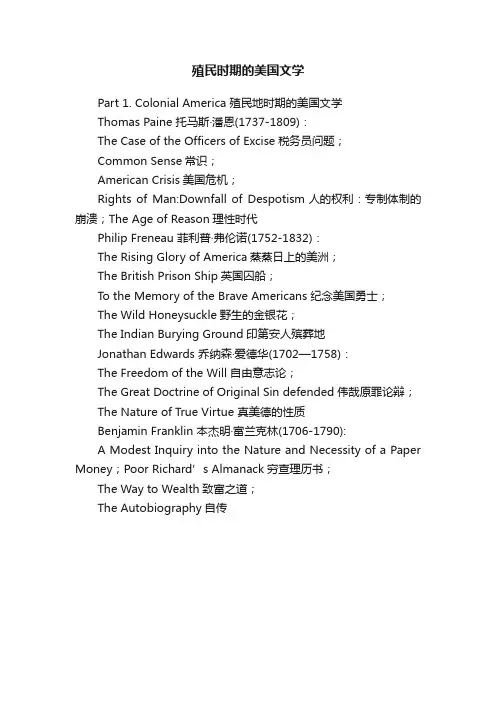
殖民时期的美国文学Part 1. Colonial America 殖民地时期的美国文学Thomas Paine 托马斯·潘恩(1737-1809):The Case of the Officers of Excise税务员问题;Common Sense常识;American Crisis美国危机;Rights of Man:Downfall of Despotism人的权利:专制体制的崩溃;The Age of Reason理性时代Philip Freneau 菲利普·弗伦诺(1752-1832):The Rising Glory of America蒸蒸日上的美洲;The British Prison Ship英国囚船;To the Memory of the Brave Americans纪念美国勇士;The Wild Honeysuckle野生的金银花;The Indian Burying Ground印第安人殡葬地Jonathan Edwards 乔纳森·爱德华(1702—1758):The Freedom of the Will自由意志论;The Great Doctrine of Original Sin defended伟哉原罪论辩;The Nature of True Virtue 真美德的性质Benjamin Franklin 本杰明·富兰克林(1706-1790):A Modest Inquiry into the Nature and Necessity of a Paper Money;Poor Richard’s Almanack穷查理历书;The Way to Wealth致富之道;The Autobiography自传。
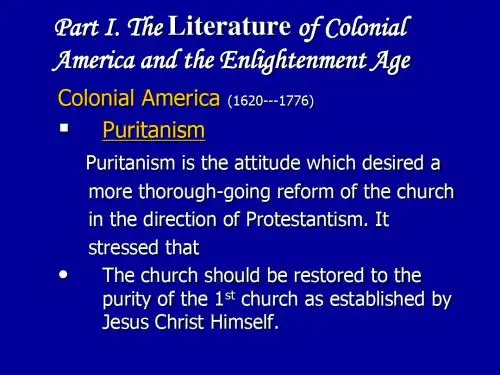
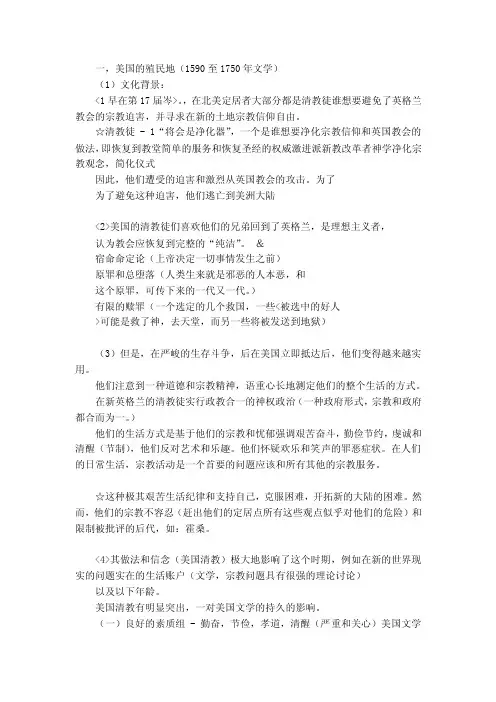
一,美国的殖民地(1590至1750年文学)(1)文化背景:<1早在第17届岑>。
,在北美定居者大部分都是清教徒谁想要避免了英格兰教会的宗教迫害,并寻求在新的土地宗教信仰自由。
☆清教徒 - 1“将会是净化器”,一个是谁想要净化宗教信仰和英国教会的做法,即恢复到教堂简单的服务和恢复圣经的权威激进派新教改革者神学净化宗教观念,简化仪式因此,他们遭受的迫害和激烈从英国教会的攻击。
为了为了避免这种迫害,他们逃亡到美洲大陆<2>美国的清教徒们喜欢他们的兄弟回到了英格兰,是理想主义者,认为教会应恢复到完整的“纯洁”。
&宿命命定论(上帝决定一切事情发生之前)原罪和总堕落(人类生来就是邪恶的人本恶,和这个原罪,可传下来的一代又一代。
)有限的赎罪(一个选定的几个救国,一些<被选中的好人>可能是救了神,去天堂,而另一些将被发送到地狱)(3)但是,在严峻的生存斗争,后在美国立即抵达后,他们变得越来越实用。
他们注意到一种道德和宗教精神,语重心长地测定他们的整个生活的方式。
在新英格兰的清教徒实行政教合一的神权政治(一种政府形式,宗教和政府都合而为一。
)他们的生活方式是基于他们的宗教和忧郁强调艰苦奋斗,勤俭节约,虔诚和清醒(节制),他们反对艺术和乐趣。
他们怀疑欢乐和笑声的罪恶症状。
在人们的日常生活,宗教活动是一个首要的问题应该和所有其他的宗教服务。
☆这种极其艰苦生活纪律和支持自己,克服困难,开拓新的大陆的困难。
然而,他们的宗教不容忍(赶出他们的定居点所有这些观点似乎对他们的危险)和限制被批评的后代,如:霍桑。
<4>其做法和信念(美国清教)极大地影响了这个时期,例如在新的世界现实的问题实在的生活账户(文学,宗教问题具有很强的理论讨论)以及以下年龄。
美国清教有明显突出,一对美国文学的持久的影响。
(一)良好的素质组 - 勤奋,节俭,孝道,清醒(严重和关心)美国文学的影响。
(2)导致了永恒的神话。
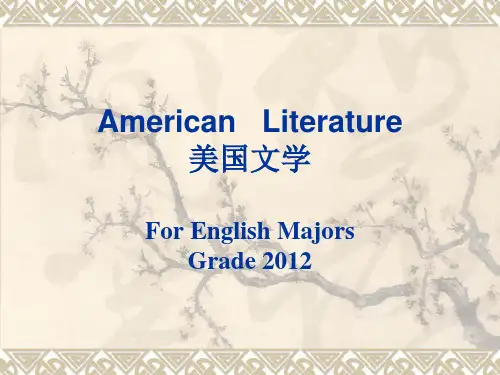
![美国文学史-殖民时期Rev[1].](https://uimg.taocdn.com/c22f5753ccbff121dc368304.webp)
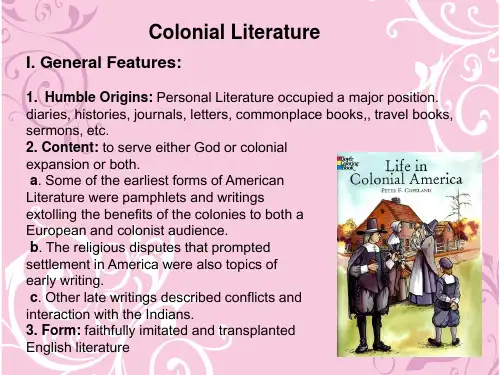
History And Anthology Of American LiteraturePart I The Literature of Colonial AmericaHistorical IntroductionThe First American Writings & WritersPuritan ThoughtsHistorical Introduction● 1. The discovery of the American continent by Christopher Columbus in 1492 Christopher Columbus’s discovery of America2. English and European explorersThe earliest settlers included Dutch, Swedes, Germans, French, Spaniards, Italians, and Portuguese, each group settling in different parts of the continent and they all contributed to the forming of the American civilization, but the colonies that became the first United States were for the most part English sustained by English traditions, ruled by English laws, supported by English commerce, and named after English monarchs and English lands.3. English and European settlementsThe first permanent English settlement in North America was established at Jamestown, Virginia in 1607. At last early in the 17th century, the English settlements in Virginia and Massachusetts began the main stream of what we recognize as the American history.Two Important New England Settlements→(Map) The Plymouth ColonyFlagship Mayflower arrives – 1620 Leader - William Bradford Settlers known as Pilgrims (朝圣者,朝觐者,清教徒前辈移民) and Separatists (主张脱离英国国教者) "The Mayflower Compact" provides for social, religious, and economic freedom, while still maintaining ties to Great Britain. The Massachusetts Bay Colony Flagship Arbella arrives – 1630 Leader - John Winthrop Settlers are mostly Puritans or Congregational (公理会教派的) Puritans "The Arbella Covenant" clearly establishes a religious and theocratic (神权政治的) settlement, free of ties to Great Britain.4. The first American writings●The first writings that we call American were the narratives and journals of thesesettlements. They wrote in diaries and in journals. They wrote letters and contracts and government charters and religious and political statements. They wrote about their voyage to the new land, about adapting themselves to the unfamiliar climates and crops, about dealing with Indians. All seemed possible to them in the new world through hard work and faith.1) Captain John Smith●His reports of exploration, published in the early 1600s, were the first distinctly Americanliterature to be written in English. Smith’s descriptions of America were filled with themes, myths, images, scenes, characters, and events that were a foundation for the nation’s literature. He portrayed English North America as a land of endless bounty.His vision helped lure the Pilgrims and the Puritans who saw themselves as new saints with a spiritual mission to flee the Old World and create a New Israel (Jerusalem---Heaven on earth), a New Promised Land, in the America that John Smith had described.2) The writers of the Southern and Middle Colonies●The writers of the Southern and Middle Colonies who followed John Smith made theirgreatest contribution to American literature in the 18th century, in the Age of Reason and Revolution.●William Byrd II Thomas JeffersonUntil that time, literature developed slowly, especially in the South. Farms widely dispersed. Towns were few. Illiteracy was high. And there was little of the religious ferment and zeal that inspired such a tide of literature to flow from Puritan New England.The First American Writer●Captain John Smith (1580-1631) was the first American writer and he published eight inall.●1)A True Relation of Such Occurrences and Accidents of Note as Hath Happened inVirginia Since the First Planting of That Colony(1608), defending the handling of the settlement and proclaiming the merits of the new land●2) A Map of Virginia: with a Description of the Country (1612), a guide to the countryand an invitation to the bold sprits needed to enlarge and strengthen the English plantations in the new land●3) General History of Virginia (1624), containing his most famous tale of how the Indianprincess Pocahontas saved him from the wrath of her father Powhatan●Captain John Smith contributed more to the survival of the Jamestown colony than didanyone else. And he saw from the beginning what was eventually to be a basic principle of American history, the need of “workers”instead of “gentlemen” for the tough job of planting colonies and pushing the frontiers westward.Early New England Literature●New England: →(Map)● A region of the northeast United States comprising the modern states of Maine, NewHampshire, Vermont, Massachusetts, Connecticut, and Rhode Island.1) A literature of ideas: New England had from the beginning a literature of ideas: theological, moral, historical, political. The Puritans had come to New England for the sake of religious freedom, while Virginia had been planted mainly as a commercial venture. Southern society was almost completely rural, interested primarily in the development of a tobacco economy.●2) Theocracy:The Puritans in New England embraced hardships, together with thediscipline of a harsh church. The first intention in Massachusetts was to found a theocracy —a society in which God would govern through the church. The church thus became the supreme political body. The ideal may have been inspiring, but because of the imperfections of the human material, in practice theocracy often led to injustice and intolerance (不容异说, 偏狭).●3) The Puritan values that dominated much of the earliest American writing: Overthe years the puritans built a way of life that was in harmony with their somber religion, one that stressed hard work, thrift (节俭;节约), piety (虔诚;虔敬), and sobriety (节制;严肃). These were the Puritan values that dominated much of the earliest American writing, including the sermons, books, and letters of such noted Puritan clergyman as John Cotton and Cotton Mather.●Cotton Mather wrote more than 450 works, an example as well as an advocate of thePuritan ideal of hard work.4) The American poets: The American poets who emerged in the 17th century adapted the style of established European poets to the subject matter confronted in a strange, new environment. Anne Bradstreet was one such poet.William Bradford and John Winthrop● 1. William Bradford (1590-1657), first governor of Plymouth. He wrote The History ofPlymouth Plantation (1856).●William Bradford started the History in 1630, ten years after the Mayflower voyage,beginning his story with an account of the small group of Puritans who migrated from England to Amsterdam and then to the New World. In addition to History, Bradford left a wealth of letters, other prose writings about the colony, and even a narrative poem.●He was perhaps the greatest of the Pilgrim Fathers. The New England colonies mournedhim at his death, in words written later by Cotton Mather, as “a common blessing and father to them all”.●The Pilgrim Fathers: English Puritans who went to America in 1620 and founded thecolony of Plymouth, Massachusetts2. John Winthrop (1588 –1649), first governor at Boston. He wrote The History of New England (1826).John Winthrop began to keep a journal on the Bay Colonists’voyage to Massachusetts aboard the ship Arbella in 1630 and he maintained this practice for the rest of his life. The History is less appropriate than “journal”, for the work has not the scope and order of a history. Yet it remains Winthrop’s chief work.● 3. Importance of the Histories●Both works are notable for their candid simplicity and honesty. Each book is the mostvaluable kind of historical source---an account of events by a man who has been a major figure of his time. Both accounts were written, not from literary ambition, but from a sense of the need to record important events in permanent form. Yet, through a direct and vigorous prose style, each account attained literary excellence.Puritan Thoughts● 1. What was a Puritan?●The “Puritan”was “a would-be purifier”. Puritans wanted to make pure their religiousbeliefs and practices. The word was coined by the opponents of the group and was applied to them in scorn; it was intended to ridicule them as persons who thought themselves holier or better than others. The undaunted Puritans claimed the name for themselves, adopting it as a badge of honor (荣誉徽章).● 2. What did the Puritans want to do?●The Puritans wished to restore simplicity to church services and the authority of the Bibleto theology. They felt that the Church of England was too close to the Church of Rome in doctrine, form of worship, and organization of authority. Another point of controversy was that the Church of England was the established church, that is, the official church of the state, and the most extreme Puritans, among them the Plymouth Plantation group, felt the influences of politics and the court had led to corruption within the church.●These Puritans were “Separatists”--- that is, they wished to break free from the Churchof England. The Massachusetts Bay group, on the other hand, wished to reform the church but remain a part of it. Yet once they were settled in the new land, they too moved gradually toward complete separation.● 3. What kind of people were the Puritans?●Puritans include people from the humblest to the loftiest ranks of English society, botheducated and uneducated, poor and rich. The Puritans looked upon themselves as a chosen people, and it followed logically that anyone who challenged their way of life was opposing God’s will and was not to be accepted. They were thus zealous in defense of their own beliefs but often intolerant of the beliefs of others. They drove out of their settlements all those whose opinions seemed dangerous to them.Puritan opposition to pleasure and the arts has sometimes been exaggerated, but it is true that their lives were disciplined and hard. Puritans tended to suspect joy and laughter as symptoms of sin. They made strict laws about private morality as well as public behavior.●Puritan religious teaching tended to emphasize the image of a wrathful God and to forgethis mercy. From this harsh side of Puritan thought comes the picture of what Nathaniel Hawthorne (author of The Scarlet Letter)called the “stern (严厉的, 苛刻的) and black-browed (黑眉毛的, 抑郁的) Puritans.”Yet this was indeed one of their aspects, but only one. Governor Bradford and Governor Winthrop were men of character, courage, and noble spirit.●Puritanism (the practices and doctrines of the Puritans) was the strongest in the NewEngland region and had great influence upon its history, its people and its literature.4. John Cotton (1584-1652) and Roger Williams●contradictory examples of PuritansJohn CottonThe first major intellectual spokesman of the Massachusetts Bay Colony, sometimes called “the Patriarch of New England.”From the time he came to Boston in 1633, he was the “teacher”( that is, spiritual leader) of the community, and its guiding influence toward the ideal of theocracy ( a state ruled by the church). John Cotton’s primary influence was through the pulpit (讲坛;布道坛).●The people of Massachusetts delighted to hear him preach, and some of his listeners wereconvinced that he could make no mistake, for “God would not suffer Mr. Cotton err (犯错误,出差错)”. Yet err he did, great and good man that he was. Practical circumstances allied him with much less noble spirits than his own in suppressing differences of opinion.●Through John Cotton we can see an important characteristic of the Puritans. They weremuch more concerned with authority than with democracy.●The Puritans faults were those common to persons who hold extreme opinions.Roger Williams●With Williams begins the history of religious toleration in America, and with him, too, thehistory of the separation of church and state. Williams advocated the freedom of belief. In him we have a balance to John Cotton.●Roger Williams was interested in the Indian language. One of his works was A Key intothe Language of America; or, A Help to the Language of the Nation in That Part of America Called New England.Anne Bradstreet and Edward TaylorMany Puritans wrote verse, sometimes using that form for their narratives of actual events. Most Puritan verse was decidedly plodding (沉重缓慢的, 单调乏味的), but the work of the two writers, Anne Bradstreet and Edward Taylor, rose to the level of real poetry.Anne BradstreetAnne Dudley Bradstreet is one of the most interesting of the early poets.Anne Dudley Bradstreet●Both her father and her husband were governors of Massachusetts.●Bradstreet’s first published work appeared in London: The Tenth Muse Lately Sprung Upin America.●She wrote well when she dealt with the simple events of her daily life. The note of piety,gently sounded, was in her work.Edward Taylor: Puritan Preacher and Poet●The best of the Puritan poets was Edward Taylor. His work followed the style and formsof the leading English poets of the mid-seventeenth century.Edward Taylor●Most of Taylor’s work treated religious themes, with many poems based directly on thePsalms.Taylor did not publish any of his work. His poems were found in manuscript in 1937, more than two hundred years after his death. This discovery brought Taylor to immediate prominence in the colonial literary history, and enriched American poetic heritage. A complete edition of Taylor’s poems appeared in 1960.Study Question●The United States has been criticized in recent years for assuming an air of moralsuperiority and for trying to impose its opinion on the rest of the world. Can you find the seeds of these American attitudes in the literature of the first two centuries? Explain your answer by referring to specific works you have read.。
The Colonial period of American LiteratureObjectives:1. Help the students to get a brief view on the background of American literature2. Explain the religious background and Puritanism3. The influence of Puritanism upon AmericaMajor Points:1. Early history of America2. Religious background and Puritanism3. The influence of Puritanism upon America1. Early history:1) America was first discovered by Columbus at the end of the 15th century.2) In 1607, Captain John Smith led some Englishmen across the ocean3) In 1620, 102 passengers sailed on the ship Mayflower across the sea and settled on the new continent ―New England‖.2. Aims (Why did Puritans come to America?)1) to reform the Church of England2) to have an entirely new church3) to escape religious persecution3. Religious belief (religion): Christianity—Puritanism1) They follow the ideas of the Swiss reformer John Calvin.2) Doctrines: Predestination 宿命论Original sin and total depravity (human beings are basically evil.)Limited atonement (or the Salvation of a selected few)3) Puritan values (creeds):Hard work, thrift, piety, sobriety, simple tastes.Puritans are more practical, tougher, and to be ever ready for any misfortune and tragic failure. They are optimistic.4) American Puritanism was one of the most enduring shaping influences in American thought and American literature.The first writings in American literature were the narratives and journals of the early colonial settlements. The first permanent English settlement in North American was established at James Town, Virginia in 1617.John Smith wrote about the exploration in A True Relation of Such Occurrences and Accidents of Note as Hath Happened in Virginia Since the First Planting of that Colony and became the first American writer. His other important writings include A Map of Virginia; with a Description of the Country and General History of Virginia, which include his famous tale of how the Indian princess Pocahontas saved him from the anger of her father Powhatan. His writings were filled with themes, myths, images, scenes, characters and event that were a foundation of American literature and helped lure the Pilgrim and Puritans to flee from the Old world (Europe) to a New Israel, a New Promised Land (the American Continent)History was an important form of literature in the colonial times. Besides John Smith, William Bradford produced his lasting work The History of the Plymouth Plantation and John Winthrop, The History of New England. New England had produced a literature of ideas: theological, moral, historical, political. The Puritans came to New England for the sake of religious freedom. Puritanism is the religious belief of the Pu ritans, who had intended to ―purify‖ or simplify the religious rituals of the Church of England. They believed in the original sin and the harsh Day of Doom, although some good people --- the chosen people or ―the Elect‖ --- may be saved. The Puritans in New England practiced theocracy, a form of government in which religion and government are combined into one. Their way of life was based on their somber religion and stressed hard work, thrift, piety and sobriety. These Puritan values greatly influenced the writings of such noted Puritan clergymen as John Cotton and Cotton Mather and the first American Poetess Anne Bradstreet. Her first published workis a collection of poems entitled The Tenth Muse Recently Sprung Up in America. Another famous Puritan poet wasEdward Taylor.William Bradford (1590-1657)William Bradford was elected governor of Plymouth in the Massachusetts Bay Colony shortly after the Separatists landed. He was a deeply pious, self-educated man who had learned several languages, including Hebrew, in order to ―see with his own eyes the ancient oracles of God in their native beauty.‖ His participation in the migration to Holland and the Mayflower voyage to Plymouth, and his duties as governor, made him ideally suited to be the first historian of his colony. His history, Of Plymouth Plantation(1651), is a clear and compelling account of the colony’s beginning. His description of the first view of America is justly famous:Being thus passed the vast ocean, and a sea of troubles...they had now no friends to welcome them nor inns to entertain or refresh their weatherbeaten bodies; no houses or much less towns to repair to, to seek for succor...savage barbarians...were readier to fill their sides with arrows than otherwise. And for the reason it was winter, and they that know the winters of that country know them to be sharp and violent, and subject to cruel and fierce storms...all stand upon them with a weatherbeaten face, and the whole country, full of woods and thickets, represented a wild and savage hue.Bradford also recorded the first document of colonial self-governance in the English New World, the ―Mayflower Compact,‖ drawn up while the Pilgrims were still on board ship. The compact was a harbinger of the Declaration of Independence to come a century and a half later.Puritans disapproved of such secular amusements as dancing and card-playing, which were associated with ungodly aristocrats and immoral living. Reading or writing ―light‖ books also fell into this category. Puritan minds pour ed their tremendous energies into nonfiction and pious genres: poetry, sermons, theological tracts, and histories. Their intimate diaries and meditations record the rich inner lives of this introspective and intense people.Anne Bradstreet (c. 1612-1672)The first published book of poems by an American was also the first American book to be published by a woman -- Anne Bradstreet. It is not surprising that the book was published in England, given the lack of printing presses in the early years of the firs t American colonies. Born and educated in England, Anne Bradstreet was the daughter of an earl’s estate manager. She emigrated with her family when she was 18. Her husband eventually became governor of the Massachusetts Bay Colony, which later grew into the great city of Boston. She preferred her long, religious poems on conventional subjects such as the seasons, but contemporary readers most enjoy the witty poems on subjects from daily life and her warm and loving poems to her husband and children. She was inspired by English metaphysical poetry, and her book The Tenth Muse Lately Sprung Up in America (1650) shows the influence of Edmund Spenser, Philip Sidney, and other English poets as well. She often uses elaborate conceits or extended metaphors. ―To My Dear and Loving Husband‖ (1678) uses the oriental imagery, love theme, and idea of comparison popular in Europe at the time, but gives these a pious meaning at the poem’s conclusion:If ever two were one, then surely we.If ever man were loved by wife, then thee;If ever wife was happy in a man,Compare with me, ye women, if you can.I prize thy love more than whole mines of goldOr all the riches that the East doth hold.My love is such that rivers cannot quench,Nor ought but love from thee, give recompense.Thy love is such I can no way repay,The heavens reward thee manifold, I pray.Then while we live, in love let s so persevereThat when we live no more, we may live ever.General ways to approach Anne Bradstreet’s poems:Check out her meter (iambic pentameter) and look for key variations in rhythm and in syntax. Ordinarily any variation from the norm set up points to special rhetorical effect or emphasis.Edward Taylor (c. 1644-1729)Like Anne Bradstreet, and, in fact, all of New England’s first writers, the intense, brilliant poet and minister Edward Taylor was born in England. The son of a yeoman farmer -- an independent farmer who owned his own land -- Taylor was a teacher who sailed to New England in 1668 rather than take an oath of loyalty to the Church of England. He studied at Harvard College, and, like most Harvard-trained ministers, he knew Greek, Latin, and Hebrew. A selfless and pious man, Taylor acted as a missionary to the settlers when he accepted his lifelong job as a minister in the frontier town of Westfield, Massachusetts, 160 kilometers into the thickly forested, wild interior. Taylor was the best-educated man in the area, and he put his knowledge to use, working as the town minister, doctor, and civic leader.Modest, pious, and hard-working, Taylor never published his poetry, which was discovered only in the 1930s. He would, no doubt, have seen his work’s discovery as divine providence; today’s readers should be grateful to have his poems -- the finest examples of 17th-century poetry in North America.Taylor wrote a variety of verse: funeral elegies, lyrics, a medieval ―debate,‖ and a 500-page Metrical History of Christianity (mainly a history of martyrs). His best works, according to modern critics, are the series of short Preparatory Meditations.Questions:1. What are the doctrines of American Puritanism?2. What are the influences of Puritanism upon America and American literature?3. What contributions did the Puritans made to American literature?THE AMERICAN ENLIGHTENMENTThe 18th-century American Enlightenment was a movement marked by an emphasis on rationality rather than tradition, scientific inquiry instead of unquestioning religious dogma, and representative government in place of monarchy. Enlightenment thinkers and writers were devoted to the ideals of justice, liberty, and equality as the natural rights of man. While theology dominated the writings of the colonial times, politics permeated the writings of the Revolution period. Thomas Paine’s Common Sense, The A merican Crisis, The Federalist Papers and the Declaration of Independence drafted by Thomas Jefferson are good examples of the fierce rhetorical and eloquence of the political writings at that period.The Enlightenment, a literary movement originated from Europe had influenced the best writers of the period. In Europe, thinkers of the Enlightenment emancipated or enlightened people’s mind from the bondage of feudalistic chains of the Middle Ages, While in America the humanistic ideas of the movement dealt a heavy blow to Puritanism in advocating science, knowledge and the power and ability of man. The Enlightenment had also influenced the literature of that period in forming a style of clarity and precision.After the United Sates achieved its independence, American intellectuals set out on the journey to a literary independence. In 1783, Noah Webster declared, ―America must be as independent in literature as she is in politics, as famous for the arts a s for arms.‖ Jefferson’s Notes on the State of Virginia a nd Bartram’s Travels carried the same notion. Yet American literature throughout the century was largely patterned on the writings of eighteenth-century English writers, notably Franklin by Addison and Steele and Joel Barlow by Alexander Pope.Benjamin Franklin (1706-1790)Benjamin Franklin, whom the Scottish philosopher David Hume called America’s ―first great man of letters,‖ embodied the Enlightenment ideal of humane rationality. Practical yet idealistic, hard-working and enormously successful, Franklin recorded his early life in his famous Autobiography. Writer, printer, publisher, scientist, philanthropist, and diplomat, he was the most famous and respected private figure of his time. He was the first great self-made man in America, a poor democrat born in an aristocratic age that his fine example helped to liberalize.Franklin was a second-generation immigrant. His Puritan father, a chandler (candle-maker), came to Boston, Massachusetts, from England in 1683. In many ways Franklin’s life illustrates the impact of the Enlightenment on a gifted individual. Self- educated but well-read in John Locke, Lord Shaftesbury, Joseph Addison, and other Enlightenment writers, Franklin learned from them to apply reason to his own life and to break with tradition -- in particular the old-fashioned Puritan tradition -- when it threatened to smother his ideals.While a youth, Franklin taught himself languages, read widely, and practiced writing for the public. When he moved from Boston to Philadelphia, Pennsylvania, Franklin already had the kind of education associated with the upper classes. He also had the Puritan capacity for hard, careful work, constant self- scrutiny, and the desire to better himself. These qualities steadily propelled him to wealth, respectability, and honor. Never selfish, Franklin tried to help other ordinary people become successful by sharing his insights and initiating a characteristically American genre -- the self-help book.The emphasis on commercial success in these and many more proverbs explains why Franklin has come down in American history as the perfect representative of the now so much discredited American Dream of ―rags to riches‖. But although the great majority of Poor Richard’s saying do stress the importance of working hard to mak e money and saving to reinvest it, so as to make more, Franklin himself was actually as far above the average bourgeois in his basic sense as in ability.He did accept the idea that happiness depended in the first place on economic success and he did optimistically believe that this was within the grasp of any normal American who worked hard, lived modestly and remain alert to seize every opportunity for practical advancement. And although he strongly condemned dishonest business practices --- in the long run, he said, ―Honesty is the best policy‖. He was also convinced that no man could be happy unless he did his best to improve the life of his society as well as his own life. Thus he himself spent time and energy to found the first lending library in the colonies while he was struggling to establish his own small print shop. And he was even more unusual in his creative lifelong devotion to scientific advance.Unlike the self-made successful businessman Franklin thought although making money was the necessary foundation for a happy life, wealth was far from the whole or even the major purpose of that life. At forty-two, when he had built a business which, shared with a working partner, could assure his family a comfortable income of five hundred pounds a year, Franklin retired. He planned to devote the rest of his life to such scientific experiments as the famous one with the kite which helped determine the nature of lightning and electricity. However the mid-century political situation made other demands upon him.First deeply involved in such volunteer social activities as the founder of the American Philosophical Society, planning the University of Pennsylvania and organizing the first free hospital in the colonies, he soon became active in national and even international political affairs.The shrewd humor and good nature so apparent in the autobiography and Poor Richard’s Almanac are part of the model he sets for the new American --- A model of democratic easy going practical individualism.Ben Franklin was an inventor not only of things, but also of ideas. First come of the things. Ben Franklin invented lightning rod; He created the first wood stove with a pipe out the back that extended through the wall. You may say: In his time, the Franklin stove produced for more heat than the fireplace, cost less to operate, was less smoky, and became popular all over the world. Franklin also published America’s first magazine and organized its first postal service and its first lending libr ary. Ben Franklin was also famous --- still is, 200 some years after his death --- for his witty observations, like Keep your eyes wide open before marriage, half-shut afterwards.‖ Or, ―There never was a good war or a bad peace.‖ Another one: ―In this world nothing is certain bu t death and taxes.‖It was he who put the ―self-evident’ in its most famous line -- ―We hold these truths to be self-evident, that all men are created equal.‖ And when it appeared that new United States may not be able to win its war against Britain, it w as old Ben, in his seventies, who was dispatched to Paris and talked the French into sending soldiers and ships to help the Americans -- help without which American today might well be a member of the British Commonwealth. It must be noted, he was pursuing, apparently with considerable luck.He died at 84. Of all his sayings, he seems to have lived up to this one the best: If you would not be forgotten, as soon you are dead and rotten, either write things worth reading, or do things worth the writing.Poor Richard’s AlmanackFranklin’s Poor Richard’s Almanack, begun in 1732 and published for many years, made Franklin prosperous and well-known throughout the colonies. In this annual book of useful encouragement, advice, and factual information, amusing charac ters such as old Father Abraham and Poor Richard exhort the reader in pithy, memorable sayings. In ―The Way to Wealth,‖ which originally appeared in the Almanack, Father Abraham, ―a plain clean old Man, with white Locks,‖ quotes Poor Richard at length. ―A Word to the Wise is enough,‖ he says. ―God helps them that help themselves.‖ ―Early to Bed, and early to rise, makes a Man healthy, wealthy, and wise.‖ Poor Richard is a psychologist (―Industry pays Debts, while Despair encreaseth them‖), and he always counsels hard work (―Diligence is the Mother of Good Luck‖). Do not be lazy, he advises, for ―One To-day is worth two tomorrow.‖ Sometimes he creates anecdotes to illustrate his points: ―A little Neglect may breed great Mischief....For want of a Nail the Shoe was lost; for want of a Shoe the Horse was lost; and for want of a Horse the Rider was lost, being overtaken and slain by the Enemy, all for want of Care about a Horse-shoe Nail.‖ Franklin was a genius at compressing a moral point: ―What maintains one Vice, would bring up two Children.‖ ―A small leak will sink a great Ship.‖ ―Fools make Feasts, and wise Men eat them.‖AutobiographyFranklin’s Autobiography is, in part, another self-help book. Written to advise his son, it covers only the early years. The most famous section describes his scientific scheme of self- improvement. Franklin lists 13 virtues: temperance, silence, order, resolution, frugality, industry, sincerity, justice, moderation, cleanliness, tranquility, chastity, and humility. He elaborate s on each with a maxim; for example, the temperance maxim is ―Eat not to Dullness. Drink not to Elevation.‖ A pragmatic scientist, Franklin put the idea of perfectibility to the test, using himself as the experimental subject.To establish good habits, Franklin invented a reusable calendrical record book in which he worked on one virtue each week, recording each lapse with a black spot. His theory prefigures psychological behaviorism, while his systematic method of notation anticipates modern behavior modification. The project of self-improvement blends the Enlightenment belief in perfectibility with the Puritan habit of moral self-scrutiny.Franklin saw early that writing could best advance his ideas, and he therefore deliberately perfected his supple prose style, not as an end in itself but as a tool. ―Write with the learned. Pronounce with the vulgar,‖ he advised. A scientist, he follo wed the Royal (scientific) Society’s 1667 advice to use ―a close, naked, natural way of speaking; positive expressions, c lear senses, a native easiness, bringing all things as near the mathematical plainness as they can.‖Despite his prosperity and fame, Franklin never lost his democratic sensibility, and he was an important figure at the 1787 convention at which the U.S. Constitution was drafted. In his later years, he was president of an antislavery association. One of his last efforts was to promote universal public education.THE POLITICAL PAMPHLET: Thomas Paine (1737-1809)T he passion of Revolutionary literature is found in pamphlets, the most popular form of political literature of the day. Over 2,000 pamphlets were published during the Revolution. The pamphlets thrilled patriots and threatened loyalists; they filledthe role of drama, as they were often read aloud in public to excite audiences. American soldiers read them aloud in their camps; British Loyalists threw them into public bonfires.Thomas Paine is a ―Great Commoner of Mankind‖, a most important revolutionary activist and political writer during the War of Independence and the French Revolution.Important works: Common Sense: A famous pamphlet appeared in 1776, which boldly advocates a ―Declaration for Independence and brings the separatist agitation to a crisis. The American Crisis: A serial of sixteen pamphlets during the War (1776-17830) that greatly restored the morale and inspired the fighting spirit of the soldiers and people of North America in times of difficulties and contained many unforgettable sentences .Writing Style: His pamphlets are succinct, powerful, persuasive and aphoristic.Important selected reading:(1) These are the times that try men’s souls: The summer soldier and the sunshine patriot will in this crisis, shrink from the service of their country; but he that stands it Now, deserves the love and thanks of men and women.(2) Tyranny, like hell, is not easily conquered; yet we have this consolation with us, that the harder the conflict, the more glorious the triumph. What we obtain too cheap, we esteem too lightly.Thomas Paine ranks among the most important American prose writers of the eighteenth century. In 1774 he arrived in Philadelphia, where he edited the Pennsylvania Magazine, and contributed to other periodicals. On January, 10, 1776, his Common Sense was published anonymousl y, which boldly advocated a ―Declaration for Independence.‖Although he had little formal education, he attained, from his wide reading, universal and profound knowledge of philosophy, political theory, and natural science. Knowledge is insight. Paine’s k nowledge, political sensibility, and literary talent enable him to utter an important social issue urgently requiring attention and expression. Common Sense sold a hundred thousand copies within three months, and preprinted abroad; its power and influence electrified the Americans to see the necessity to have an independent nation of their own. When the war was over, he returned to Europe in 1789, where he took part in the early activities of the French Revolution, and became associated with radical movements in England. In addition, Paine continued to write. The Age of Reason expressed his deistic view of religion. His other major work included The Rights of Man, an answer to Burke’s Reflection on the Revolution in France.The prose work of Thomas Paine, along with that of Franklin and Jefferson, exhibited the eighteenth century concepts of the nature and function of literary art, it was characterized by a style incomparably smooth and lucid yet vigorous and eloquent, and by a structure that was logical and crystal-clear. Besides exemplifying rationalism, order, neoclassic simplicity, utilitarian tendency, and other major predication of the literary theory of the age, his prose lies in the sincerity and passion of his unshakable belief in the rights of the humblest man as well as in the fiery ardor and determination of his words.Thomas Jefferson (1743-1826)Life achievement: an important revolutionary statesman during the American War of Independence, the main drafter of the declaration of Independence, and the third president of the United Sates. His democratic ideas have run into the veins of the American people generation after generation.Life Philosophy: Influenced by Voltaire, John Locke and other writers and philosophers of the Enlightenment, he was a fervent believer and advocator of democracy, liberty and selfhood. He held that the natural rights of man must be secured by law inalienably for all, irrespective of station, and that government, a necessary evil, should be established only with the common consent of a social contract and can govern only with the consent of the governed.Important selected readingsWe hold these truths to be self-evident, that all men are endowed by their Creator with certain unalienable Rights, that among these are Life, Liberty and the pursuit of Happiness. --- That to secure these rights, Governments are instituted among men, deriving their just powers from the consent of the governed, --- That whenever any form of Government becomes destructive of these ends, it is the R ight of the People to alter or to abolish it, and to institute new government…Thomas Jefferson has been taken as one of the most versatile and enlightened men of his generation. Upon graduation from William and Mary College, he practiced law for a short time, however, he soon gave it up, and threw himself into public life, which provided a forum for him to display his genius as political leader.A member of the Continental Congress, principal author of the Declaration of Independence, Governor of Virginia, Minister to France, Secretary of State, Vice president, and President, all these titles manifest his successful career. Besides his accomplishment in politics, Jefferson possessed astonishingly rich knowledge which embraced such diverse fields as classical learning and literature, natural science, agriculture, architecture, and education.Jefferson was so productive that his writings may run to fifty volumes, although he only published eight titles in his lifetime. As to his literary reputation, Jefferson is famous for his masterly prose style that is classically spare, and remarkable in ease, simplicity, and power. The Declaration of Independence exemplified his simple and clear, powerful and graceful style that has been widely admired. Notes on the States of Virginia (1784), has been his only work that can be called a book, consisted of twenty-three sections, dealing with such topics as natural resources, geography, landscape, inhabitants, slavery, government, law, education, religion, and social customs. It was a veritable storehouse of human ideas and liberal democracy, its inspiring and stimulating power touched both the American and the European. Its French translation appeared in 1786.One of the most eloquent spokesmen of American ideas, Jefferson exhibited in his various kinds of writings his faith in the absolute authority of reason, his deistic philosophy, his love for classical literature, and his interest in natural science. In addition to his neoclassical prose style that has gained him a position in the history of American literature, Jefferson has been admired particularly for his social philosophy oriented toward the equal rights of man and the rational happiness of the individual, as he stated in a letter to Benjamin Rush: ―I have sworn upon the altar of God, eternal hostility against every form of tyranny over the mind of man.‖Philip Freneau (1752-1832)Life achievement: Philip Freneau was the first important American poet. He was transitional literary figure from the Enlightenment to the Romantic period.His subject matter, themes and style: Philip Freneau was neoclassical by training and taste and yet romantic in essential spirit. He was also at once a satirist and sentimentalist, a humanitarian but also a bitter polemicist, a poet of Reason yet the celebrant of ― lovely fancy‖, a deistic optimist most inspired by themes of death and transience. His close observation of nature distinguished his treatment of the native wild life and other native American subjects. He developed a natural, simple style with concrete diction.Important poems: ―The British Prison Ship‖: It is a poetic narrative of his bitter experience of captivity during the War of Independence and the best example of his political poems. ―The Wild Honey Suckle‖: It is Philip Freneau’s most widely read natural lyric with the theme of transience. The central image is a native wild flower, which makes a drastic difference from elite flower images typical of traditional English poems. The Indian Burial Ground‖: It is another poeti c description of native subjects --- the Indians. In this poem, beauty, fancy, awe, death and eternity are harmoniously interwoven.A poet who has been called the ―Father of American Poetry‖, Philip Freneau played an unique transitional role between the neoclassicism in the second half of the eighteenth century and the romanticism in the first quarter of the nineteenth. Besides his success in poetry, Freneau was also active in public life, his ideal of establishing an independent and democratic。